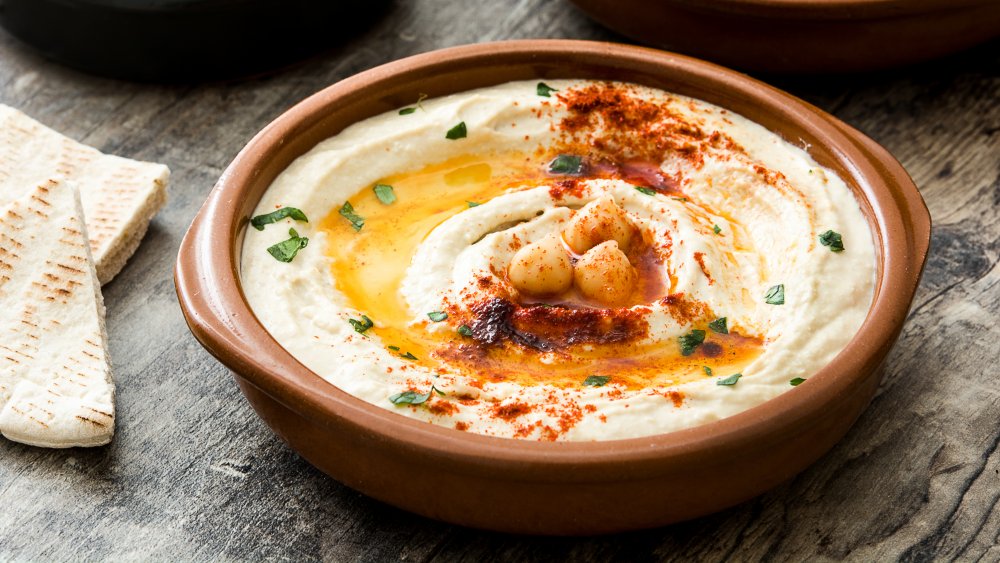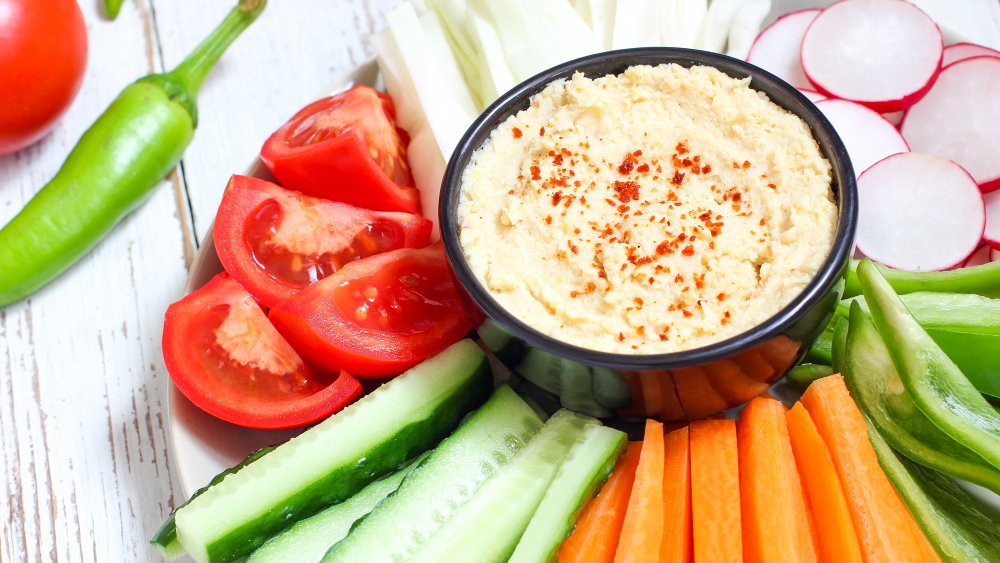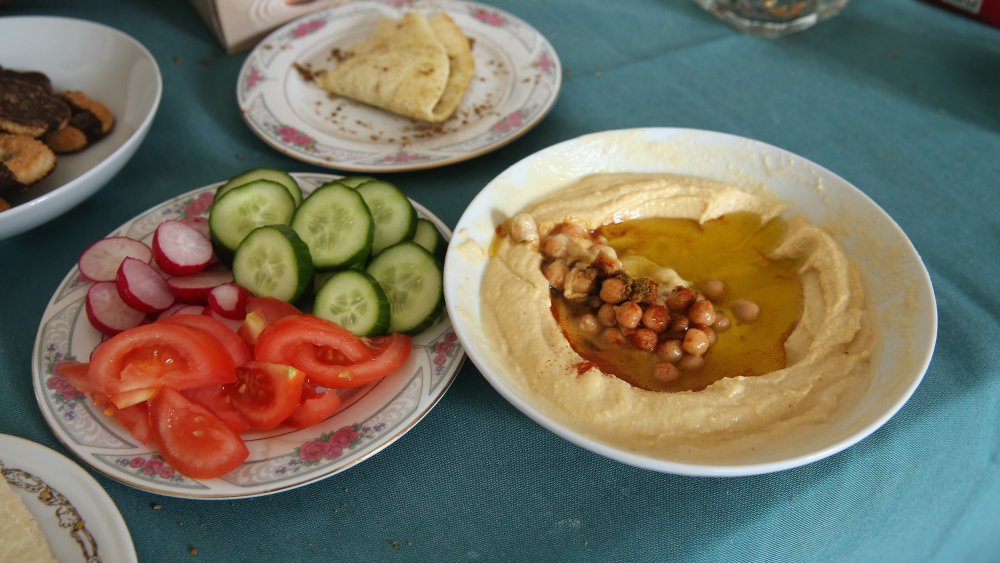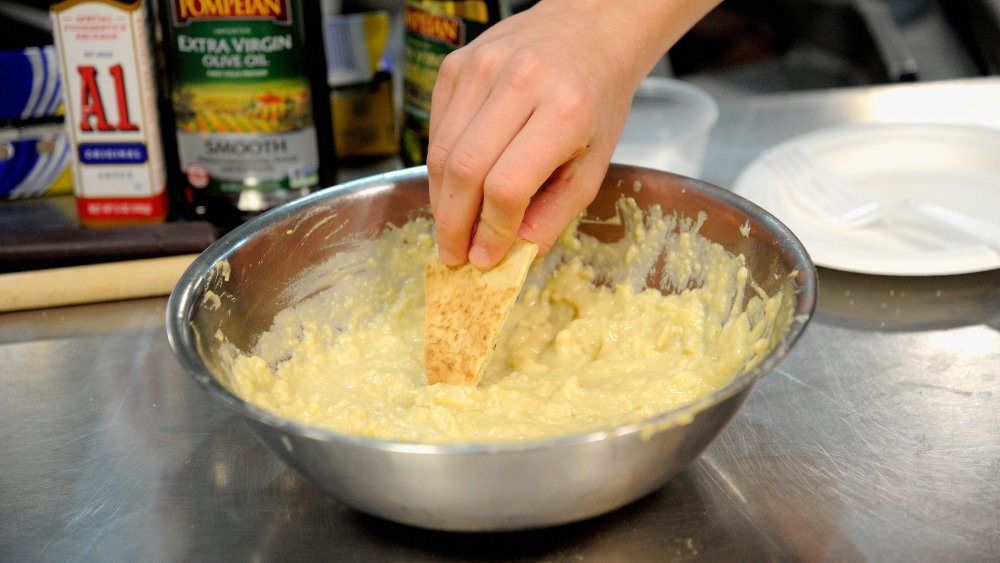When You Eat Hummus Every Day, This Is What Happens To Your Body
In 2010, Chef Ramzi Choueiri got about 300 student chefs together at their university in Lebanon to make what has become the largest serving of hummus ever, according to Guinness World Records. The ceramic plate (which is also a world record holder for largest ceramic plate) had a diameter just over 23 feet and was big enough to hold more than 23,000 pounds of hummus.
We can only imagine how many folks ended up having to consume hummus every day just to keep the record-breaking dish from going off. But if you're a hummus diehard, the thought of eating it day in and day out probably sounds just about perfect to you. Whether you enjoy it as a snack with veggies, on top of a salad, or in a sandwich, it's a go-to food for countless Americans.
Even though its popularity has soared relatively recently, hummus has been around for a long time. Even Middle Easterners themselves aren't entirely sure when hummus was invented, or who came up with the idea of making hummus, but as the BBC points out, most of its ingredients go back thousands of years. In fact, the chickpea itself dates back more than 10,000 years, as one of the earliest legumes humans ever thought to cultivate. Some people even say hummus is a biblical dish.
But ancient history aside, what exactly happens to your body if you eat hummus every day?
Hummus can help ward off weight gain
Hummus consists of chickpea mash mixed with ground sesame seed paste (aka tahini), lemon juice, olive oil, salt, and garlic — and it's a nutritional star, high in protein. Vincent Pedre, an internist and author of Happy Gut, endorsed hummus by calling it a great on-the-go-snack (via LiveScience). He added that, "in fact, it [hummus] is rich in healthy fats, making it a satisfying in-between meal snack with carrots and/or celery. I often recommend this to get patients away from the processed snacks or sweets they may reach for between meals," Pedre says.
With 10 grams of protein and 10 grams of dietary fiber (via Health), hummus is a great way to wean yourself off processed snacks. What's more, people who include hummus as a regular part of their diet have higher levels of fiber, folate, magnesium, potassium, iron, and vitamins A, E, and C, according to the journal Nutrients. And this vital mix of nutrients helps hummus eaters have lower BMIs and smaller waistlines than those who pass on the spread, and they reduce their risk of obesity by 53 percent.
Hummus helps keep your heart healthy
Because hummus is made with olive oil and sesame seed paste, you might have heard that it contains a great deal of fat, making it bad for overall heart health. But nutritionists like Rhiannon Lambert say, not so fast. "Despite the misconception ... traditionally-made hummus is a wholesome food made with chickpeas, olive oil — a heart-healthy unsaturated fat," Lambert told Independent.
Basically, hummus is chockfull of plant-based polyunsaturated and monounsaturated fats, which can reduce your risk of heart disease and lower blood pressure, per Cooking Light. What's more, the olive oil in hummus contains phenolic antioxidant compounds, which are powerful anti-inflammatories that help protect your heart (via Runner's World).
Homemade hummus is the healthiest choice
Before you go to the supermarket and pick up every pre-made tub of hummus you can find, here's one more tip about this dip: Hummus is healthiest if you make it at home. Commercially made hummus might be made with oils that aren't as good for you as the olive oil you may have in your own pantry.
Supermarket hummus may also have preservatives like potassium sorbate and sodium benzoate — which could turn a diet do into a diet maybe (via Health). Dietitian Nichola Ludlam-Raine points out that: "Not all hummus is created equally. The quality of commercial hummus varies widely and not everything you see on the store shelves is traditionally made. Some have excess oil and sugar," she says. "Checking the ingredients list is key, and even better, it is so simple to make yourself at home" (via Independent).



